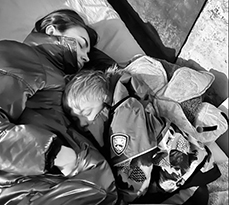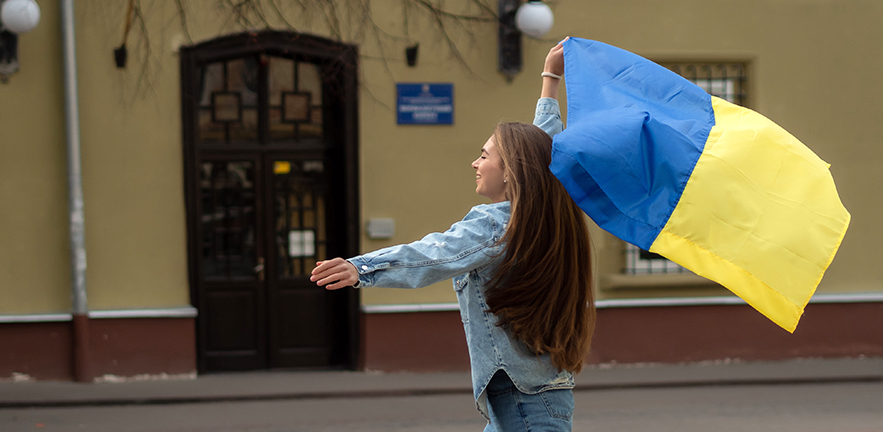Maryna Marchenko, who heads a charity to help mothers in Ukraine, says she enriched her life and her work through the Rising Women Leaders Programme at Cambridge Judge Business School.

Maryna Marchenko knew she had made the right decision to leave the Ukraine war behind for a week in June to enrich her leadership skills when, lunching in a sunny Cambridge College garden, she saw an airplane soaring overhead and didn’t “fear it was a fighter jet”.
“It was a great chance for me to recover and recharge,” Maryna says of her week on the Rising Women Leaders Programme at Cambridge Judge Business School.
“It’s very difficult living thru a war: you try to help families, friends and neighbours, or even people you don’t know at all, so I had to recover my mind by thinking not about war but about communication between women in the programme and improving my leadership skills – something I could bring back home to Ukraine after the programme.”
Maryna, age 26, heads an organisation based in Kyiv known as Lada, which helps women learn new skills and return to the workforce after having children. Lada is named after the goddess of marriage and fertility, and is also the name of a shirt dress popular among Ukrainian women; the charity now has 5 full-time staff, a network of outside specialists and 20 volunteers.
A native of Donetsk in eastern Ukraine, which was invaded by Russian forces in 2014, Maryna studied law at the University of Kyiv and worked as a lawyer before founding Lada four years ago. She lives in Kyiv with her husband, Ukraine’s Finance Minister, Sergii Marchenko, and children aged 4 and 11.
Maryna attended the Executive Education programme at Cambridge Judge on 22-25 June along with 20 other women from around the world, including Poland, Belgium and Australia. Led by Patrizia Vecchi, Assistant Professor in Organisational Behaviour at the School, the programme included modules on a strength-based approach to leadership skills, finding meaning in work and resilience, and negotiation strategy, and guest lectures by the likes of Smaranda Gosa-Mensing and Dr Cath Bishop. More than 200 women leaders have attended the programme since it began in 2017.
“Maryna and her story were very inspirational to everyone associated with the programme – faculty, staff and fellow participants,” says Patrizia. “On the Rising Women Leaders programme, we talk about what leadership means and what behaviours exemplify it.
“Leadership is about motivating and unifying those around you around a common purpose and making them want to follow you even when the path ahead is uncertain. It’s not about titles; it’s about standing for what you believe in, fighting for what is right, and showing the way. What Maryna is doing for her country, her commitment to stay no matter the risks, and her conviction to help other women to support their families while their husbands are on the battlefront to keep them safe, is leadership to the highest levels.
“When Maryna shared her story, it became clear to everybody that we didn’t need to look far to think of an example of a great leader: she was standing right in front of us. I believe that I speak on behalf of all our participants in saying that she inspired us all. I’m proud our programme has helped Maryna on her really important journey to help other women in Ukraine,” says Patrizia.
Maryna talks about how the war in Ukraine overturned life in her country, how she and her charity have adapted, and how the Rising Women Leaders Programme helped her to better serve women back in Ukraine through her organisation’s work.
Life for every Ukrainian is now divided into before 24 February and after 24 February, the day of Russia’s invasion. I woke up on 24 February to loud sounds and my husband’s words: “The war has begun”. I couldn’t accept it because only the day before I lived my ideal life in my lovely Kyiv, I went to work, picked up the children from school and kindergarten, and we had dinner with the whole family. Then everything stopped: you don’t know what will happen tomorrow and you don’t understand even how today will finish. It is very painful.
Everything changed in my work in the charity sphere due to the war. Before the war, we provided conditions and opportunities for mothers after they had babies, for socialisation and reintegration to the labour market. Since the war begin, women have been giving birth under stress in shelters under alerts, and many had to leave their homes with their children carrying only one bag – they had to start life over from the beginning. There is a lot of destruction, and people don’t really understand their situation.
My work now is therefore the adaptation of existing projects to wartime conditions. For example, we had a very successful project before the war to help mothers return to the labour market by starting their own businesses or changing their professional career – based on three blocks of five videos. Since the war began we realised that we need to provide women with information on mental health issues and the actual situation of the labour market, so we decided to produce two more blocks of videos about doubts and depression, and another block of videos on how the labour market has changed due to the war.
The labour market in Ukraine has turned upside down. Many traditionally male spheres in Ukraine such as logistics and building have many openings, because the men are fighting at the front. Also, IT and agriculture became open for women. On the other side, Ukrainians are losing their jobs in the occupied territories and competition in the labour market is rising in the territories with a high quantity of temporarily displaced people, or internal refugees. Small and medium-sized businesses are faced with many problems and challenges: some of them continue to work, some are reducing activity and staff, some are closing. Women are facing the need to protect their children, be strong and work for the economic security of their family while supporting their country.
I planned to attend the Rising Women’s Leadership Programme at Cambridge Judge Business School even before the war had begun. I am a young woman and head of a public organisation in my country. So, I can say that I am a leader, but I had questions, fears and doubts about my role, and at the same time a desire to develop and expand my activities. I wanted to make the next step in my work, to understand who a leader is and how I can become a better one.
Learning helps even in the most difficult times. Exchanging energy with other participants and feeling their support was really important for me. The training helped me understand who I am now in new conditions, where I am going, and what my next step is. I have now returned to Ukraine stronger, more confident: I learned how to network, how to negotiate better, and how my body influences my presentation skills, something we picked up from Leandra Ashton, a communications expert who spoke to us.
My main dream is peace in Ukraine. My main ambition is to be useful and, in doing so, be happy and successful. My main motto now is to celebrate and love every day, and act on it, be ready for quick changes, not put everything off for tomorrow, and not doubt a lot.
I want to return to Cambridge. It was an exciting and brilliant educational experience in my life. And I would like to have the opportunity to visit the sessions there once more – to gain new knowledge and competence and energy and to bring them to home to make my life and the life of my country better.


